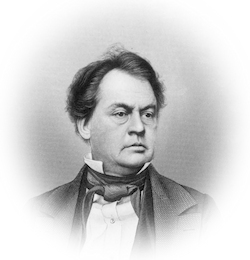Washington, D. C, June 9th, 1860.
Dear Stephens, … I observe the proceedings of the Milledgeville convention. I do not see but that both wings passed substantially the same resolutions, and why they split I can not tell except under it lies mere personal preferences for the Presidency. I am well satisfied that an explanation of the Cincinnati platform is wise and necessary and made so by the conduct of Mr. Douglas alone. He is not passive in his opposition to the opinions of a very great majority of the party North and South, but he is active, and his official conduct if we were to elect him on the old Cincinnati platform would subvert the principles of the party. There is much greater reason for an explanatory article than in 1856, for the Kansas-Nebraska act was a party interpretation (in terms) of the legislation of 1850. Douglas’s speech in the Senate after the Charleston convention compelled every man to an unconditional submission to his construction or to fight him. I think the latter was the course of duty. I am fully aware that personal hostilities and personal advantages are at the bottom of the strife; but there is a right and a wrong to the controversy for all that. I think the condition of the party is such that nobody can be elected by it, and I do not see that much could be gained by its success. I have ceased to interest myself further than to give my decided opinions to all who ask for them. I think we will adjourn by the 25th Inst. Julia is well tho’ still lame, and sends her kindest regards to you.
From Annual Report of the American Historical Association for the Year 1911.
Robert Augustus Toombs was an American lawyer, planter, and politician from Georgia who became one of the organizers of the Confederacy and served as its first Secretary of State. He served in the Georgia House of Representatives, the US house of Representatives, and the US Senate. In the Confederacy, he served in Jefferson Davis’ cabinet as well as in the Confederate States Army, but later became one of Davis’ critics.
Alexander Hamilton Stephens was an American politician who served as the vice president of the Confederate States from 1861 to 1865. After serving in both houses of the Georgia General Assembly, he won election to Congress, taking his seat in 1843. After the Civil War, he returned to Congress in 1873, serving to 1882 when he was elected as the 50th Governor of Georgia, serving there from late 1882 until his death in 1883.
